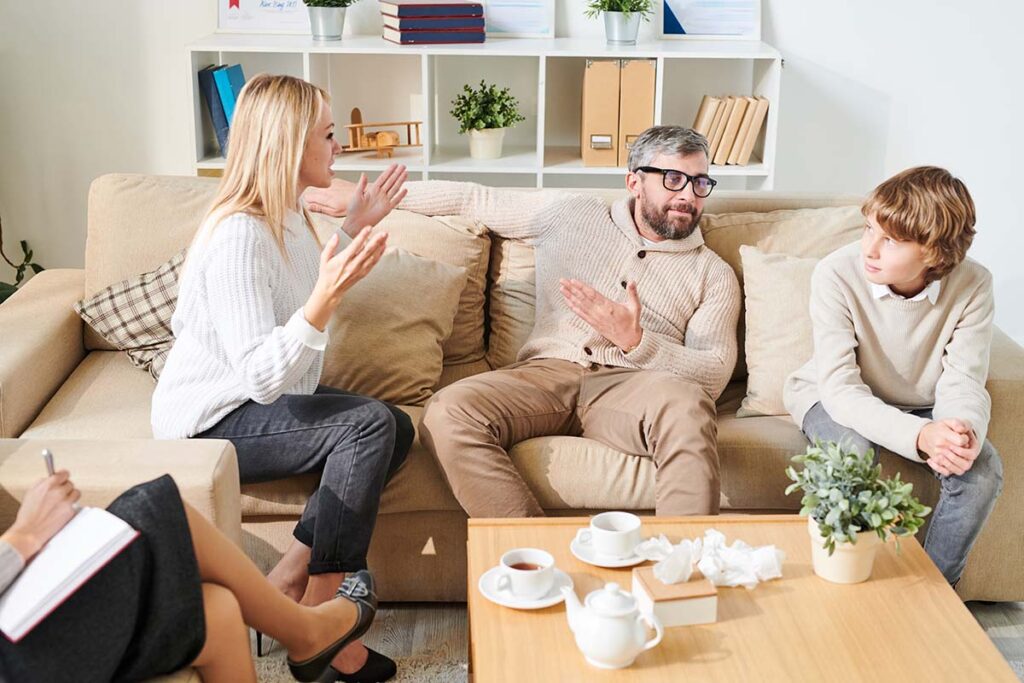The relationships most affected by addiction are family relationships. As a result, effective addiction treatment programs should include a family therapy program to help heal these relationships. Contact Foothills at Red Oak Recovery at 866.300.5275 for more information on family therapy for addiction.
How a Family Therapy Program for Addiction Can Help
Treating addiction involves far more than just removing the drugs. It includes examining mental and emotional health issues and behavioral patterns and habits. This treatment forms the basis of the work a client does during an addiction treatment program.
These factors are deeply tied to a user’s most immediate and influential environment — the family system. Lasting recovery means looking into the causes and consequences of a client’s drug use.
1. Supports Addiction Recovery
First and foremost, family therapy for addiction is used as an effective part of a client’s treatment plan. Oftentimes, addiction is due to beliefs and behaviors learned in childhood. Relationship dynamics between family members, even in healthy families, may contribute to developing a substance use disorder.
Family therapy allows clients to engage in constructive, direct dialogue about complex issues that they usually do not discuss. It’s also a way for clients to take accountability by acknowledging and apologizing for how their actions have hurt their family members.
2. Allows Family Members to Be Heard
A family therapy program also helps the family members affected by the actions of someone with a substance use disorder. Addiction is often not understood well by family and friends. Parents, siblings, and other family members can all find healing when they are all able to express their feelings and see their loved one make efforts to recover from addictive behaviors. In addition to issues related to addiction, family therapy also offers family members the chance to confront and heal areas in which they may have unhealthy habits or unresolved traumas.
3. Builds a Healthy Family Dynamic
Most people haven’t developed healthy communication and conflict resolution skills. This means that even when addiction isn’t an issue, most family dynamics involve some form of dysfunction. Working to address and improve family relational skills with the help of a trained professional can make a life-altering difference in how family members understand and relate to one another.
Some family members feel reluctant to attend family therapy sessions, thinking they might consist of blame, fault-finding, or arguments. Others may hesitate to air personal family problems in front of a therapist.
These are all normal concerns. Although a therapy session can involve some discomfort as the family addresses complex topics, the outcome is a long-lasting improvement in family relationships.
What Happens During Family Therapy for Addiction?
Family therapy sessions should improve communication skills. Family members can bring up subjects that may cause anger or resentment in order to achieve understanding and forgiveness.
During sessions, family members work on:
- Identifying unhealthy aspects of relationships
- Learning effective communication skills
- Learning conflict resolution
- Discussing suppressed or avoided family issues in a safe environment
- Taking accountability for past actions
- Achieving understanding and forgiveness
- Making a plan to support recovery and improve relationships
Family therapy sessions can reduce conflict and teach more effective communication techniques to everyone involved.
Foothills at Red Oak Recovery Makes Family Healing Possible
A family therapy program for addiction can bring new forms of understanding and communication into your family unit, resulting in long-term healing. If you’re looking for a family therapy program to help understand and cope with addiction’s impact on your family, Foothills at Red Oak Recovery can help. Contact Foothills at Red Oak Recovery at 866.300.5275 to learn more about our teen treatment options and family therapy program for addiction.

